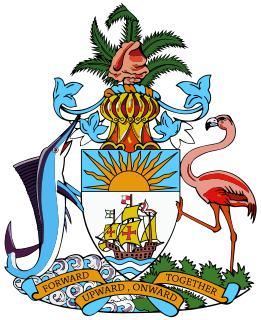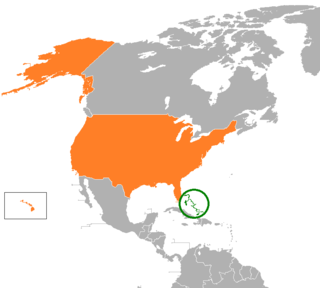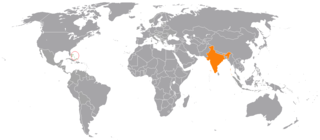| |||||
| Decades: | |||||
|---|---|---|---|---|---|
| See also: | |||||
This article lists events from the year 2003 in The Bahamas .
| |||||
| Decades: | |||||
|---|---|---|---|---|---|
| See also: | |||||
This article lists events from the year 2003 in The Bahamas .

The Bahamas, known officially as the Commonwealth of The Bahamas, is a country within the Lucayan Archipelago of the West Indies in the Atlantic. It takes up 97% of the Lucayan Archipelago's land area and is home to 88% of the archipelago's population. The archipelagic state consists of more than 700 islands, cays, and islets in the Atlantic Ocean, and is located north of Cuba and Hispaniola Island, northwest of the Turks and Caicos Islands, southeast of the US state of Florida, and east of the Florida Keys. The capital is Nassau on the island of New Providence. The Royal Bahamas Defence Force describes The Bahamas' territory as encompassing 470,000 km2 (180,000 sq mi) of ocean space.

Nassau is the capital and largest city of The Bahamas. With a population of 274,400 as of 2016, or just over 70% of the entire population of the Bahamas (≈391,000), Nassau is commonly defined as a primate city, dwarfing all other towns in the country. It is the centre of commerce, education, law, administration and media of the country.

The earliest arrival of humans in the islands now known as The Bahamas was in the first millennium AD. The first inhabitants of the islands were the Lucayans, an Arawakan-speaking Taino people, who arrived between about 500 and 800 AD from other islands of the Caribbean. Their ancestors came from mainland South America, where Arawakan-language peoples were present in most territories, and especially along the northeastern coast. Bahamian descendents were mostly from North and South Africa.
Telecommunications in the Bahamas includes telephones, radio, television, and the Internet.

The Abaco Islands lie in the northern Bahamas, 180 miles off the South Florida coast. They comprise the main islands of Great Abaco and Little Abaco, along with smaller barrier cays. The northernmost are Walker's Cay, and its sister island Grand Cay. To the south, the next inhabited islands are Spanish Cay and Green Turtle Cay, with its settlement of New Plymouth, Great Guana Cay, private Scotland Cay, Man-O-War Cay, and Elbow Cay, with its settlement of Hope Town. Southernmost are Tilloo Cay and Lubbers Quarters. Another of note off Abaco's western shore is onetime Gorda Cay, now a Disney Island and cruise ship stop and renamed Castaway Cay. Also in the vicinity is Moore's Island. On the Big Island of Abaco is Marsh Harbour, the Abacos' commercial hub and the Bahamas' third largest city, plus the resort area of Treasure Cay. Both have airports. A few mainland settlements of significance are Coopers Town and Fox Town in the north and Cherokee and Sandy Point in the south. Administratively, the Abaco Islands constitute seven of the 31 Local Government Districts of the Bahamas: Grand Cay, North Abaco, Green Turtle Cay, Central Abaco, South Abaco, Moore's Island, and Hope Town.

Grand Bahama is the northernmost of the islands of the Bahamas, lying 103 kilometres (64 mi) off Palm Beach, Florida. It is the fourth largest island in the Bahamas island chain of approximately 700 islands and 2,400 cays. The island is roughly 530 square miles (1,400 km2) in area and approximately 153 kilometres (95 mi) long west to east and 24 kilometres (15 mi) at its widest point north to south. Administratively, the island consists of the Freeport Bonded Area and the districts of East Grand Bahama and West Grand Bahama. Nearly half of the homes on the island were destroyed in early September 2019 due to Hurricane Dorian.

Eleuthera refers both to a single island in the archipelagic state of The Commonwealth of the Bahamas and to its associated group of smaller islands. Eleuthera forms a part of the Great Bahama Bank. The island of Eleuthera incorporates the smaller Harbour Island. "Eleuthera" derives from the feminine form of the Greek adjective ἐλεύθερος (eleútheros), meaning "free". Known in the 17th century as Cigateo, it lies 80 km east of Nassau. It is long and thin—180 km long and in places little more than 1.6 km wide. Its eastern side faces the Atlantic Ocean, and its western side faces the Great Bahama Bank. The topography of the island varies from wide rolling pink sand beaches to large outcrops of ancient coral reefs, and its population is approximately 11,000. The principal economy of the island is tourism.

The Lucayan Archipelago, also known as the Bahama Archipelago, is an island group comprising the Commonwealth of The Bahamas and the British Overseas Territory of the Turks and Caicos Islands. The archipelago is in the western North Atlantic Ocean, north of Cuba along with the other Antilles, and east and southeast of Florida.

The Bahamas national football team is controlled by the Bahamas Football Association; it was founded in 1967 and joined FIFA in 1968. Bahamas has never qualified for the FIFA World Cup. In 2011, they withdrew from the 2014 FIFA World Cup qualifiers after playing in the first round.

The Parliament of The Bahamas is the bicameral national parliament of Commonwealth of The Bahamas. The parliament is formally made up of the Queen, an appointed Senate, and an elected House of Assembly. It currently sits at Nassau, the national capital.

The Royal Bahamas Defence Force (RBDF) is the military of The Bahamas. Since The Bahamas does not have an army or an air force, its navy composes the entirety of its armed forces. Under The Defence Act, the Royal Bahamas Defence Force has been mandated to defend The Bahamas, protect its territorial integrity, patrol its waters, provide assistance in times of disaster, maintain order in conjunction with the law enforcement agencies of The Bahamas, and carry out any such duties as determined by the National Security Council. The Defence Force is also a member of CARICOM's Regional Security Task Force. The task force has seen action in the United Nations mandate in Haiti 1994.

Bahamas – United States relations are bilateral relations between the Commonwealth of The Bahamas and the United States of America.

The following outline is provided as an overview of and topical guide to The Bahamas:

The monarchy of the Bahamas is a system of government in which a hereditary monarch is the sovereign of the Commonwealth of The Bahamas. The current monarch and head of state is Queen Elizabeth II, who has reigned since the country became independent on 10 July 1973. The Bahamas share the Sovereign with the other Commonwealth realms. The Queen does not personally reside in the islands, and most of her constitutional roles are therefore delegated to her representative in the country, the Governor-General of the Bahamas. Royal succession is governed by the English Act of Settlement of 1701, as amended by the Succession to the Crown Act 2013 of the Parliament of the United Kingdom, with the latter statute reflecting the Perth Agreement, to which the Bahamas government acceded. The two acts are part of constitutional law.
Religion in the Bahamas is dominated by various Christian denominations and reflects the country's diversity. Since the English colonization, most Bahamians adhere to diverse Protestant denominations with Anglicanism, Baptist churches, Pentecostalism, Adventism and Methodism being at the forefront. There is no state religion in the Bahamas, and there is generally free practice of religious beliefs.
Miss Bahamas is a national Beauty pageant in The Bahamas.

Visitors to The Bahamas must obtain a visa from one of the Bahamian diplomatic missions or British diplomatic missions unless they come from one of the visa exempt countries.

The prime minister of the Bahamas is the head of government of the Bahamas, currently Hubert Minnis. Minnis, as leader of the governing Free National Movement party (FNM), He was sworn in as Prime Minister on 11 May 2017, succeeding Progressive Liberal Party (PLP) leader Perry Christie. This was a result of the FNM's victory in the Bahamas general election of 10 May 2017. The prime minister is formally appointed into office by the governor general of the Bahamas, who represents Elizabeth II, the queen of the Bahamas.

The Bahamas–India relations refers to the international relations that exist between The Bahamas and India. The Bahamas maintains an Honorary Consulate in New Delhi. The High Commission of India in Kingston, Jamaica concurrently accredited to The Bahamas. India does not have a resident diplomatic mission in The Bahamas.

The COVID-19 pandemic in the Bahamas is part of the COVID-19 pandemic of coronavirus disease 2019 (COVID-19). The outbreak was identified in Wuhan, China, in December 2019, declared to be a Public Health Emergency of International Concern on 30 January 2020, and recognised as a pandemic by the World Health Organization on 11 March 2020. It was confirmed to have reached the Bahamas on 15 March 2020 with the announcement of the first case.